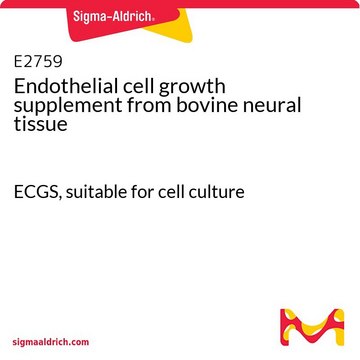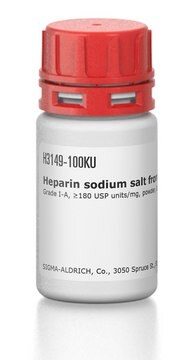M8537
MCDB 131 Medium
With ʟ-glutamine, without sodium bicarbonate, powder, suitable for cell culture
Synonym(s):
131 Medium, Medium 131, Molecular, Cellular, and Development Biology 131 medium
Sign Into View Organizational & Contract Pricing
All Photos(1)
About This Item
UNSPSC Code:
12352207
NACRES:
NA.75
Recommended Products
Product Name
MCDB 131 Medium, With trace elements and L-glutamine, without sodium bicarbonate, powder, suitable for cell culture
form
powder
concentration
11.6 g/L
technique(s)
cell culture | mammalian: suitable
components
sodium pyruvate: 0.11 g/L
phenol red: 0.012 g/L
L-glutamine: 1.461 g/L
HEPES: no
glucose: 1.0 g/L (Dextro)
shipped in
ambient
storage temp.
2-8°C
General description
MCDB-131 medium provides a defined and optimally balanced nutritional environment that selectively promotes the growth of specific cell types. MCDB-131 is designed to support clonal growth of human microvascular endothelial cells, including human umbilical vein endothelial cells, when supplemented with 0.7% FBSP, 10 ng/ml epidermal growth factor, and 1 μg/ml hydrocortisone. MCDB media is made for the low-protein or serum-free growth of specific cell types using hormones, growth factors, trace elements, or low levels of dialyzed fetal bovine serum protein (FBSP).
Application
MCDB-131 Medium has been used:
- as a component of the basal medium to culture bovine retinal endothelial cells
- to culture bovine lung microvascular endothelial cells
- for the isolation of porcine endocranial endothelial cells and porcine aortic endothelial cells
Quantity
Formulated to contain 11.6 grams of powder per liter of medium.
Reconstitution
Supplement with 1.18 g/L sodium bicarbonate.
also commonly purchased with this product
Product No.
Description
Pricing
Storage Class Code
11 - Combustible Solids
WGK
WGK 1
Flash Point(F)
Not applicable
Flash Point(C)
Not applicable
Choose from one of the most recent versions:
Already Own This Product?
Find documentation for the products that you have recently purchased in the Document Library.
Customers Also Viewed
G S Ajithkumar et al.
Cardiovascular toxicology, 16(4), 390-405 (2015-12-15)
Endocardial endothelial cells (EECs), when compared with endothelial cells of arteries and veins, possess higher resistance to apoptosis-inducing anticancer agents. The mechanism of this resistance property is unknown. We have investigated the molecular mechanism, which contributes to increased cell survival
Sandra S Hammer et al.
Diabetologia, 64(7), 1674-1689 (2021-03-27)
Homo sapiens evolved under conditions of intermittent food availability and prolonged fasting between meals. Periods of fasting are important for recovery from meal-induced oxidative and metabolic stress, and tissue repair. Constant high energy-density food availability in present-day society contributes to
Ya-Guang Liu et al.
Molecular human reproduction, 15(10), 665-673 (2009-06-10)
Transforming growth factor beta 1 (TGF-beta1) levels are increased in the peritoneal fluid of endometriosis patients, and endometrial cells express TGF-beta signaling components; however, little is known regarding the role of TGF-beta in endometriosis. Our objective was to examine the
Our team of scientists has experience in all areas of research including Life Science, Material Science, Chemical Synthesis, Chromatography, Analytical and many others.
Contact Technical Service







